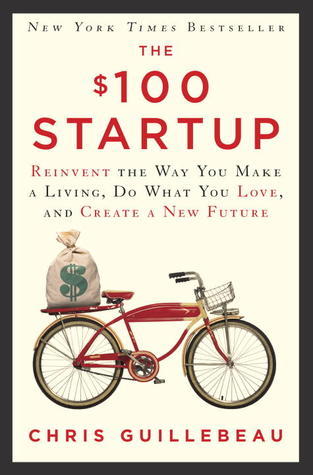The $100 Startup by Chris Guillebeau
The $100 Startup by Chris Guillebeau renewed my belief in the idea that I could start a profitable venture with just the skills I have, doing just the work I enjoy, with a little bit of money, and a lot of well-placed effort.

The $100 Startup by Chris Guillebeau renewed my belief in the idea that I could start a profitable venture with just the skills I have, doing just the work I enjoy, with a little bit of money, and a lot of well-placed effort.
I picked up this book a few years ago while scanning for titles I might enjoy reading... and after reading it, I have to say that I do not regret my choice. As the title says, the book is about starting a business with $100 or less but more importantly, it is about people who have started a business for $100 or less. In other words, the book is filled with examples of people who have done just what the book proposes, and how they did it.
This fact is what makes the book so believable. It is possible to start a business for next to nothing and make a good living. As a business development consultant, it is my job to help people grow their businesses, and as the C.T.O of my company it has been my role to facilitate that growth with technology. But for the longest time, I have wanted to supplement that living with a side hustle or two, and I have believed that they should be passion-driven.
What is there to hide? This project, The Red String, is one I have wanted to monetize for a while. I have teetered between thinking it was possible and doubting its feasibility over and over again. But this book made me see that with the right moves, I could do it.
That said, even though the book detailed chapter by chapter the different steps that different founders took to achieve success with their enterprises, I didn't come out at the end of it with a plan for mine. This is partly because I was reading to understand not implement, and so I didn't take the actions that were suggested in real-time. I just took away the fact that I could do it X way. I suppose that when I am truly ready to make the decision about whether, and how, to turn The Red String into a money-generating project, I will revisit the ideas in this book. Speaking of which...
The book is divided into 3 parts:
- Unexpected Entrepreneurs
- Taking it to the Streets
- Leverage and Next Steps
Each part has 4 - 5 chapters, each talking about different aspects of the part's subject, for a total of 14 chapters. As you can tell from the part headings, part 1 is mostly introductory, providing the basis for the rest of the book. Part 2 is where the rubber hits the ground, and the real meat of the book is presented, and part 3 rounds it all up and ushers you into taking action.
To conclude, I shall quote the author:
Remember, this book isn't about founding a big internet startup, and it isn't about opening a traditional business by putting on a suit and begging for money at the bank. Instead, it's the account of people who found a way to live their dreams and make a good living from something they cared deeply about.
Don't worry, I'm not going to be like Elon Musk and start charging you $8 for something you already get for free and by merit. I don't even quite know how I'm going to do it (or even if I am). But what I do know is that it is possible - and that my friends, is hope.